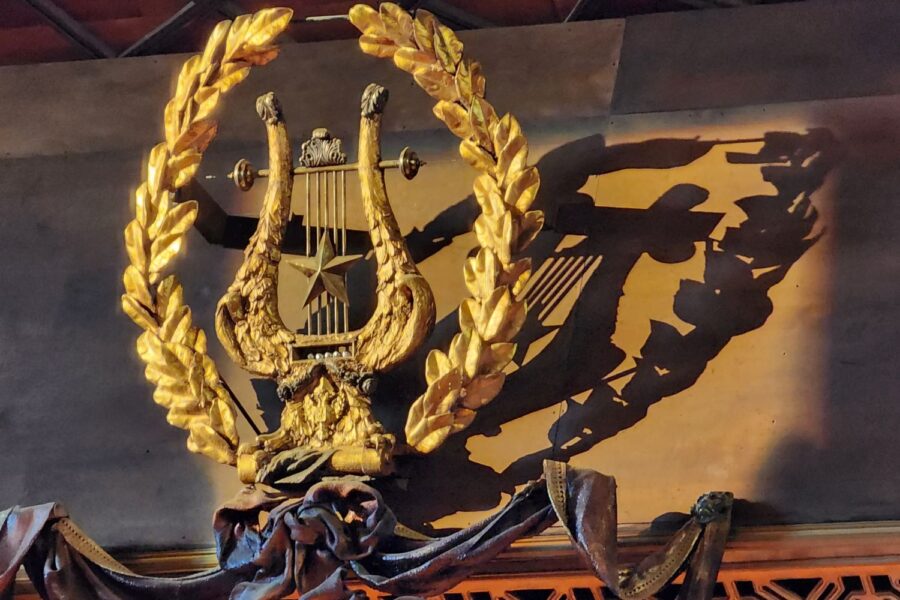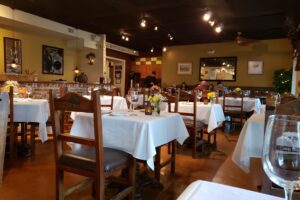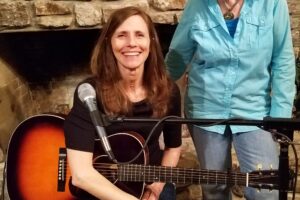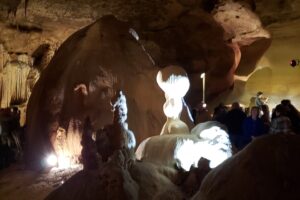Despite this dry 105-degree day in August, we choose to take the long way to Festival Hill—the quiet way—winding down back country roads leading seemingly nowhere.
Upon reaching our destination, it appears we are opposite of where we are meant to be—the rear entrance greets us. There is a parking lot back here, a rather large one, so Michael noses the car into a barely shaded space, and together we walk across the graveled path toward the front entrance of Festival Hill.
Festival Hill Institute

Looking up at the imposing edifice, it still takes my breath away. I remember the first time I saw Festival Hill—we never left the car—and my exclamation of surprise was, “Michael, what is a place like THIS doing HERE in the middle of nowhere?” We didn’t even know where we were. We were looking for summer Shakespeare productions near a humble barn, under the stars. This was definitely not it!
Years later, an acquaintance informed us that the astonishing structure in the middle of nowhere had a name, The Round Top Festival Hill Institute, and a purpose. It was a concert hall—a venue of and for music. I found their website and began keeping track of upcoming events. Soon afterward, I made reservations to attend a classical guitar concert on a Saturday in the springtime.
As soon as we stepped foot inside the concert hall, with the sole purpose of listening to classical guitars, I found myself surrounded by old-world elegance. It was a symphony wrought in wood and light—with an understated Texas twist—a star. Then I saw there was more than one. They were everywhere! Layered. Inlaid. Pieced together. An exquisite creation of symmetry.
James Dick
I was in awe of my surroundings back then, and I’m still in awe now, that one man, James Dick, a pianist of international fame, had the tenacity and determination to create this place.



Over fifty years ago, James Dick had a dream, and today’s realization of that dream is a 200-acre campus—with multiple historic buildings and gorgeous gardens—dedicated to music. Festival Hill Institute’s purpose is to teach, encourage, create, collect, and provide a venue for performing music of all genres, hosting one of the major music festivals in the United States. And then there is this amazing 1,000-seat concert hall where we now stand. Along with its striking beauty, the concert hall is touted to be one of the acoustically best in the country.
Today, we are here for the first concert of their August through April season, performed by a piano duo we never heard of before I purchased tickets to this concert. When I think of piano duos, the very first names that come to mind are Ferrante & Teicher—my musical idols when everyone my age adored rock and roll. Then I met Michael and discovered that silver thread and golden needles can’t mend a broken heart and learned to embrace Country music. Now we both love all music and attend concerts anywhere. Anytime—if we are able. We drive for music.
A Concert at Festival Hill


Concert Stage at Festival Hill Institute in Round Top, Texas
So far, every concert we have attended at Festival Hill has open seating, with all tickets the same price. Arriving thirty minutes early, we choose seats in the orchestra section. Arriving thirty minutes before us, our friends chose box seats that are a tad elevated, but not mezzanine level elevated. There are two more levels of box seats above them. And since we are here early, I have time to ponder the program while Michael chats with his friend across the aisle—whose seat is just a tad higher.
The Split Second Piano Duo
Roberto Hidalgo and Marc Peloquin—the Split Second Piano Duo—are on the program to take the stage this afternoon at 3 p.m. They are two pianists we are unfamiliar with, playing music from composers whom we mostly have never heard of—however, reviews refer to these two pianists as The Dynamic Duo, and I trust James Dick, the pianist-founder of Festival Hill, to introduce us to something wonderful in the world of music.


I am totally confused. At the top of the program, I see two names at the beginning of the first piece—a German composer, Schumann, and a French composer, Debussy. Debussy’s name is in parentheses and is given credit for the arrangement for two pianos. I’ve never seen this on a program for classical music before; maybe I just wasn’t looking. But, thanks to my phone and a good internet connection, Google answers all my questions before the piano duo takes the stage.
Before the first note is struck, we are advised that photography and recordings during the concert are not allowed, and the announcement crushes my soul. But perhaps this is a good thing; now nothing will distract me from the music.
When the concert begins, talented fingers touch ivory keys, all questions fade, and sound invades my senses. The music starts softly, like gently falling rain, and ends in a fury of rolling thunder and lashing waves with a piece by a Spanish composer, Manuel de Falla—Two Dances from La Vida Breve. The audience is brought to their feet in appreciative applause, trying to match the sound that dies on stage.
Sitting here waiting for the second half to begin, I can’t help but think the concert set the same pace as a wine tasting, starting with light whites and roses, graduating to lighter reds, and finishing with the biggest, boldest red wine in the cellar. Music and wine. They have more in common than I thought.
From a Summer Wind to the Garden of Eden
The second half of the concert begins with Debussy invoking “… Pan, god of the summer wind,” and delicate notes from two concert pianos fill the air. For some reason—perhaps because I saw Shakespeare’s A Midsummer Night’s Dream several times—I can envision the scene.
The last piece on the program is by an American composer, William Bolcom, The Serpent Kiss. In parentheses, it says Ragtime. One more time, the program puzzles me. But the composition begins, full of hissing and clicking and tapping and fingers flying so fast they are a blur. And once again, the air is filled with fury—and the audience roars their appreciation. Roberto Hidalgo and Marc Peloquin, the Split Second Piano Duo, definitely are also the Dynamic Duo!
Back in the car, Michael agrees we must make reservations for next month’s concert at Festival Hill—a Premiere British-Style Brass Band from Houston. Once again, we are clueless as to what is in store, and we don’t care. We know it will be wonderful.
Round Top Festival Hill Institute Information


- Information
- 248 Jaster Road
- PO Box 89
- Round Top, TX 78954
- 979-249-3129
To learn more and view upcoming concerts, click on the following link:
- And because I love the music and because someday I will ask myself, why didn’t you write it down?
- Robert Schumann (1810-1856)
- (Arr. for two pianos by Claude Debussy)
- Six Studies in Canonic Form, op. 56
- Nicht zu schnell
- Mit innigem Ausdruck
- Andantino
- Inning
- Nicht zu schnell
- Adagio
- Francis Poulenc (1899-1963)
- L’embarquement pour Cythere, FP 150
- Francis Poulenc (1899-1963)
- Elegie, FP175
- Manuel de Falla (1876-1946)
- Two Dances from La Vida Breve (arr. for piano four hands by Gustave Samazeuilh)
- Intermission
- Claude Debussy (1862-1918)
- Epigraphes antiques, CD 139 (1915)
- Pour invoquer Pan, dieu du vent d’été (“To invoke Pan, god of the summer wind”)
- Pour un tombeau sans nom (“For a nameless tomb”)
- Pour que la nuit soit propice (“In order that the night be propitious”)
- Pour la danseuse aux crotales (“For the dancer with crotales”)
- Pour l’égyptienne (“For the Egyptian woman”)
- Pour remercier la pluie au matin (“To thank the morning rain”)
- William Bolcom (b.1938)
- Through Eden’s Gates (Cakewalk)
- William Bolcom (b.1938)
- Choro – Homage to Nazareth
- William Bolcom (b.1938)
- Paseo (in memory of Louis-Moreau Gottschalk)
- William Bolcom (b.1938)
- The Serpent Kiss (Ragtime)









1 Comment
Leave your reply.